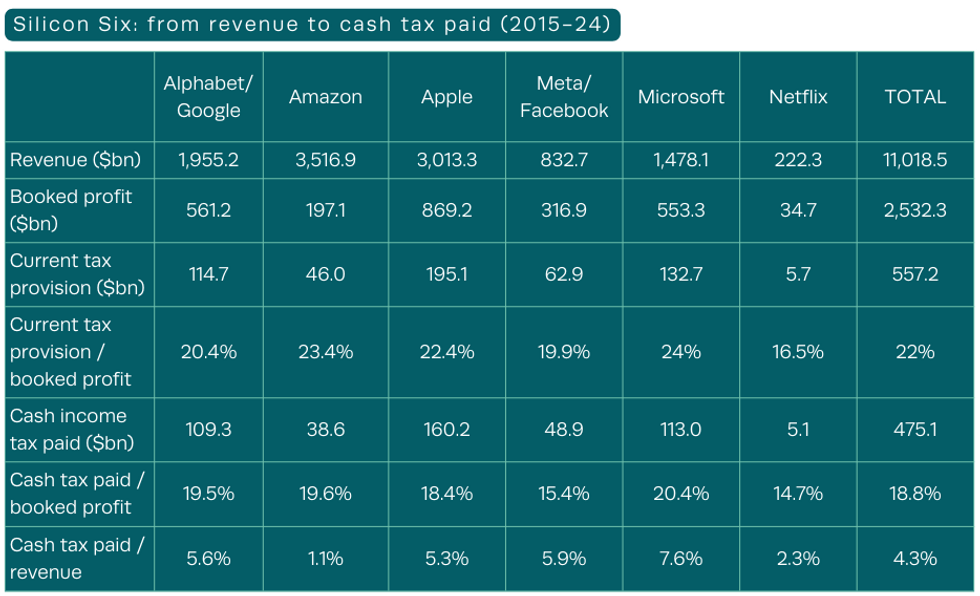
Garment workers protest the U.S.-based corporation Amazon in Dhaka, Bangladesh, on November 29, 2024.
Tax Day Report Exposes Six US Corporate Giants Responsible for Dodging $278 Billion
"Our analysis would indicate that tax avoidance continues to be hard-wired into corporate structures," said the CEO of the Fair Tax Foundation.
A report published Tuesday to coincide with the tax filing deadline in the United States found that, over the past decade, six of the country's largest tech corporations have paid nearly $278 billion less in taxes than they should have under statutory tax rates worldwide.
The analysis by the Fair Tax Foundation (FTF) estimates that the so-called "Silicon Six"—Amazon, Meta, Alphabet, Netflix, Apple, and Microsoft—paid an average corporate income tax rate of 18.8% on a combined $2.5 trillion in profits between 2015 and 2024.
That's well below the average statutory corporate tax rate during that period in the U.S. (29.7%) and globally (27%), resulting in a "tax gap" of $277.8 billion.
"Our analysis would indicate that tax avoidance continues to be hard-wired into corporate structures," said Paul Monaghan, FTF's chief executive officer. "The Silicon Six's corporate income tax contributions are, in percentage terms, way below what sectors such as banking and energy are paying in many parts of the world."
Of the six corporate behemoths examined in the report, Amazon is the worst tax offender, according to FTF—but all of the companies are guilty of what the group called "aggressive" practices to avoid taxation.
The companies have also benefited greatly from the foreign-derived intangible income tax break. FTF said that, thanks to the tax break, "much of the Silicon Six's overseas revenue is subject to 'tax haven' level rates" in the U.S.
"This is especially so at Meta (Facebook), Alphabet (Google), and Netflix, where the foreign-derived intangible income (FDII) deduction reduced their effective tax rate by a substantial five percentage points each in 2024," the new analysis found. "The FDII has been worth $30 billion to the Silicon Six over the past three years alone."
The analysis comes as Republicans in the U.S. Congress and President Donald Trump work to advance another round of tax cuts that would predominantly benefit wealthy Americans and large corporations. The Trump administration is also trying to gut the Internal Revenue Service with large-scale workforce cuts, which would further hinder the agency's ability to pursue rich tax cheats.
FTF's new report notes the "enormous political influence" that the Silicon Six exert to preserve and enhance their tax benefits: The six companies spent a combined $115 million lobbying the U.S. government and the European Union last year.
To prevent corporate tax avoidance that is costing governments around the world billions of dollars in revenue that could be spent on education, healthcare, and other priorities, FTF said the U.S. should "end the FDII tax break" and back a 15% global minimum tax on multinational corporations.
In February, Trump withdrew the U.S. from a tax agreement that included a global minimum levy.
FTF also urged other governments to "give more serious consideration to the degree to which the Silicon Six's overseas revenue is subject to low levels of corporate income tax and develop more assertive responses to ensure that a fairer tax contribution is secured and so that more equitable business competition can operate within their jurisdictions."
An Urgent Message From Our Co-Founder
Dear Common Dreams reader, The U.S. is on a fast track to authoritarianism like nothing I've ever seen. Meanwhile, corporate news outlets are utterly capitulating to Trump, twisting their coverage to avoid drawing his ire while lining up to stuff cash in his pockets. That's why I believe that Common Dreams is doing the best and most consequential reporting that we've ever done. Our small but mighty team is a progressive reporting powerhouse, covering the news every day that the corporate media never will. Our mission has always been simple: To inform. To inspire. And to ignite change for the common good. Now here's the key piece that I want all our readers to understand: None of this would be possible without your financial support. That's not just some fundraising cliche. It's the absolute and literal truth. We don't accept corporate advertising and never will. We don't have a paywall because we don't think people should be blocked from critical news based on their ability to pay. Everything we do is funded by the donations of readers like you. Will you donate now to help power the nonprofit, independent reporting of Common Dreams? Thank you for being a vital member of our community. Together, we can keep independent journalism alive when it’s needed most. - Craig Brown, Co-founder |
A report published Tuesday to coincide with the tax filing deadline in the United States found that, over the past decade, six of the country's largest tech corporations have paid nearly $278 billion less in taxes than they should have under statutory tax rates worldwide.
The analysis by the Fair Tax Foundation (FTF) estimates that the so-called "Silicon Six"—Amazon, Meta, Alphabet, Netflix, Apple, and Microsoft—paid an average corporate income tax rate of 18.8% on a combined $2.5 trillion in profits between 2015 and 2024.
That's well below the average statutory corporate tax rate during that period in the U.S. (29.7%) and globally (27%), resulting in a "tax gap" of $277.8 billion.
"Our analysis would indicate that tax avoidance continues to be hard-wired into corporate structures," said Paul Monaghan, FTF's chief executive officer. "The Silicon Six's corporate income tax contributions are, in percentage terms, way below what sectors such as banking and energy are paying in many parts of the world."
Of the six corporate behemoths examined in the report, Amazon is the worst tax offender, according to FTF—but all of the companies are guilty of what the group called "aggressive" practices to avoid taxation.
The companies have also benefited greatly from the foreign-derived intangible income tax break. FTF said that, thanks to the tax break, "much of the Silicon Six's overseas revenue is subject to 'tax haven' level rates" in the U.S.
"This is especially so at Meta (Facebook), Alphabet (Google), and Netflix, where the foreign-derived intangible income (FDII) deduction reduced their effective tax rate by a substantial five percentage points each in 2024," the new analysis found. "The FDII has been worth $30 billion to the Silicon Six over the past three years alone."
The analysis comes as Republicans in the U.S. Congress and President Donald Trump work to advance another round of tax cuts that would predominantly benefit wealthy Americans and large corporations. The Trump administration is also trying to gut the Internal Revenue Service with large-scale workforce cuts, which would further hinder the agency's ability to pursue rich tax cheats.
FTF's new report notes the "enormous political influence" that the Silicon Six exert to preserve and enhance their tax benefits: The six companies spent a combined $115 million lobbying the U.S. government and the European Union last year.
To prevent corporate tax avoidance that is costing governments around the world billions of dollars in revenue that could be spent on education, healthcare, and other priorities, FTF said the U.S. should "end the FDII tax break" and back a 15% global minimum tax on multinational corporations.
In February, Trump withdrew the U.S. from a tax agreement that included a global minimum levy.
FTF also urged other governments to "give more serious consideration to the degree to which the Silicon Six's overseas revenue is subject to low levels of corporate income tax and develop more assertive responses to ensure that a fairer tax contribution is secured and so that more equitable business competition can operate within their jurisdictions."
A report published Tuesday to coincide with the tax filing deadline in the United States found that, over the past decade, six of the country's largest tech corporations have paid nearly $278 billion less in taxes than they should have under statutory tax rates worldwide.
The analysis by the Fair Tax Foundation (FTF) estimates that the so-called "Silicon Six"—Amazon, Meta, Alphabet, Netflix, Apple, and Microsoft—paid an average corporate income tax rate of 18.8% on a combined $2.5 trillion in profits between 2015 and 2024.
That's well below the average statutory corporate tax rate during that period in the U.S. (29.7%) and globally (27%), resulting in a "tax gap" of $277.8 billion.
"Our analysis would indicate that tax avoidance continues to be hard-wired into corporate structures," said Paul Monaghan, FTF's chief executive officer. "The Silicon Six's corporate income tax contributions are, in percentage terms, way below what sectors such as banking and energy are paying in many parts of the world."
Of the six corporate behemoths examined in the report, Amazon is the worst tax offender, according to FTF—but all of the companies are guilty of what the group called "aggressive" practices to avoid taxation.
The companies have also benefited greatly from the foreign-derived intangible income tax break. FTF said that, thanks to the tax break, "much of the Silicon Six's overseas revenue is subject to 'tax haven' level rates" in the U.S.
"This is especially so at Meta (Facebook), Alphabet (Google), and Netflix, where the foreign-derived intangible income (FDII) deduction reduced their effective tax rate by a substantial five percentage points each in 2024," the new analysis found. "The FDII has been worth $30 billion to the Silicon Six over the past three years alone."
The analysis comes as Republicans in the U.S. Congress and President Donald Trump work to advance another round of tax cuts that would predominantly benefit wealthy Americans and large corporations. The Trump administration is also trying to gut the Internal Revenue Service with large-scale workforce cuts, which would further hinder the agency's ability to pursue rich tax cheats.
FTF's new report notes the "enormous political influence" that the Silicon Six exert to preserve and enhance their tax benefits: The six companies spent a combined $115 million lobbying the U.S. government and the European Union last year.
To prevent corporate tax avoidance that is costing governments around the world billions of dollars in revenue that could be spent on education, healthcare, and other priorities, FTF said the U.S. should "end the FDII tax break" and back a 15% global minimum tax on multinational corporations.
In February, Trump withdrew the U.S. from a tax agreement that included a global minimum levy.
FTF also urged other governments to "give more serious consideration to the degree to which the Silicon Six's overseas revenue is subject to low levels of corporate income tax and develop more assertive responses to ensure that a fairer tax contribution is secured and so that more equitable business competition can operate within their jurisdictions."


